Last week, I remarked that the Department of Justice hadn’t filed a lawsuit to block JetBlue’s acquisition of Spirit Airlines. They’ve since filed and here’s the data they need to shut the merger down.
If you are considering booking travel or signing up for a new credit card please click here. Both support LiveAndLetsFly.com.
If you haven’t followed us on Facebook or Instagram, add us today.
Ignoring All Other Arguments
There should be just one question that the courts answer from this proposed acquisition/merger/combination between Jetblue and Spirit Airlines: Will consumers lose?
There’s no point in arguing about mergers of the past (I’ll explain shortly.) Ignore the Northeast Alliance that touches 75% of JetBlue’s capacity and is essentially revenue shared and non-competitive with American Airlines. Forget about whether it’s better for workers (arguments can be made on either side of that agreement), or whether the product will be better with JetBlue (Spirit’s Big Front Seat can’t compete with Mint Studio.)
Other Airline Mergers
There’s also no comparison among the other major mergers/acquisitions in the sector. When Delta and Northwest combined, they had the same business model, United and Continental too. US Airways and American were similar on the surface though a case could be made that they were more different than the rest. Southwest and AirTran at the time of their combination were very similar and even Alaska and Virgin America both operated on the west coast, were (at the time) unaffiliated with an alliance, etc.
JetBlue mostly operates via hubs, has partnered with American, and flies to Europe with a premium product. Spirit operates more point-to-point, enters a market with a number of destinations, is absolutely geared toward price-conscious consumers, and has no interest in an alliance or codeshare partnership of any kind. With the other mergers the question was more of how many markets do the two carriers compete on solely against each other, and what will that do to fares. They were consolidating, but this is both the increase of one carrier and the elimination of a completely different type of business model.
We are going to ignore all of that because there is just one question that needs to be answered for the purpose of the lawsuit to block JetBlue/Spirit Airlines merger: Will consumers win or lose if the JetBlue Airways corporation swallows Spirit Airlines whole?
There’s No Question That Consumers Will Lose on Fares
The fundamental question before the DOJ and judges have to be whether the combination of the two airlines will make a “national low fare challenger” as JetBlue Airways Corp. would have you believe or whether it will lead to higher fares for consumers.
Spirit is the only ULCC flying business markets nonstop with consistency, putting pressure on the majors and giving consumers a low-price option. Southwest is no longer low cost and certainly not low fare, Allegiant doesn’t fly between major cities. Frontier doesn’t compete in those markets either (for the most part) and when it does, flights aren’t daily and regular. Here are some examples, all with the same dates for departure and arrival (midweek April 11-13.)
Let’s start with one close to home for me. Pittsburgh-New York City (any airport) is 250% higher on any other airline, JetBlue doesn’t compete even to its JFK hub.

Chicago to New Orleans is 213% higher on United.
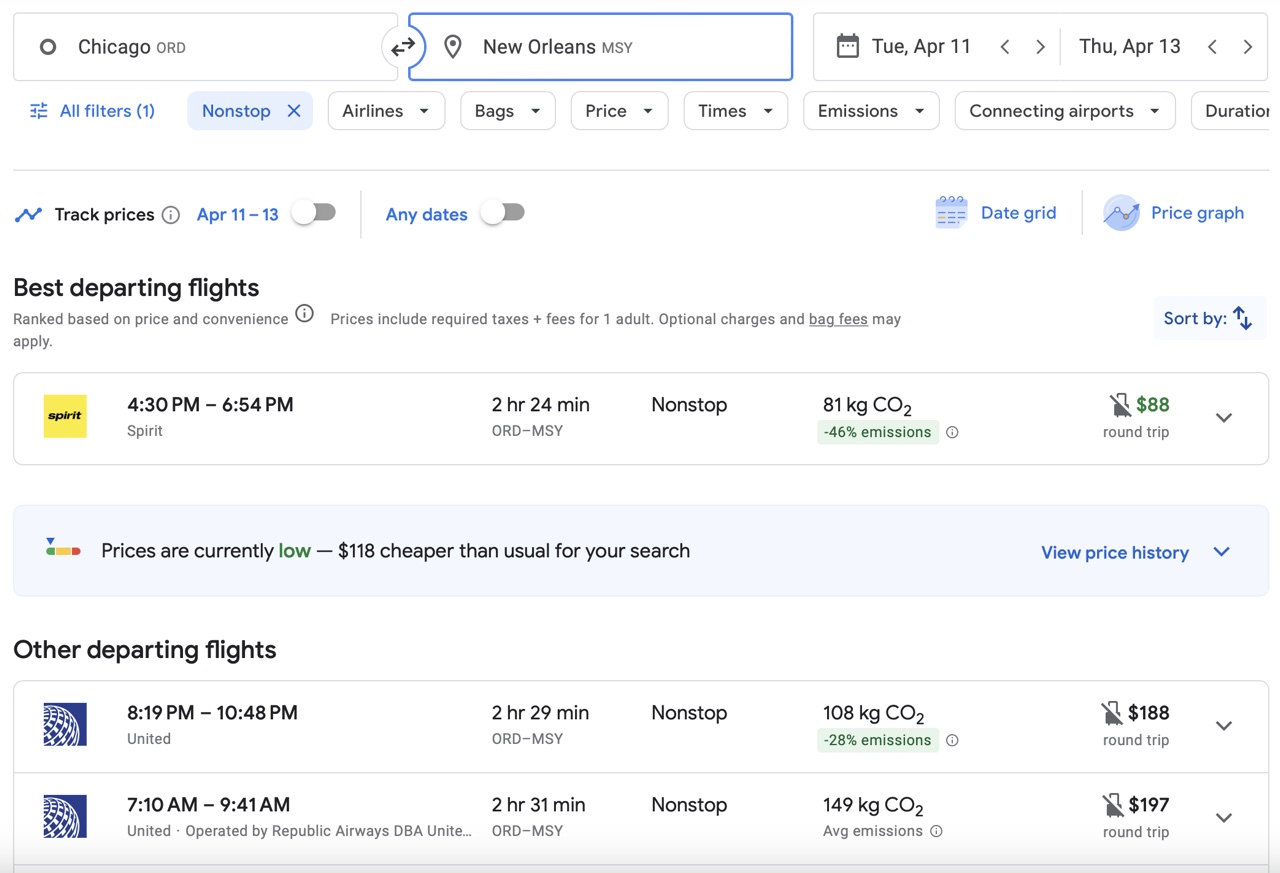
Chicago to Houston (Bush Intercontinental) is 67% higher on American who is trying to stick it to United for $20 cheaper.
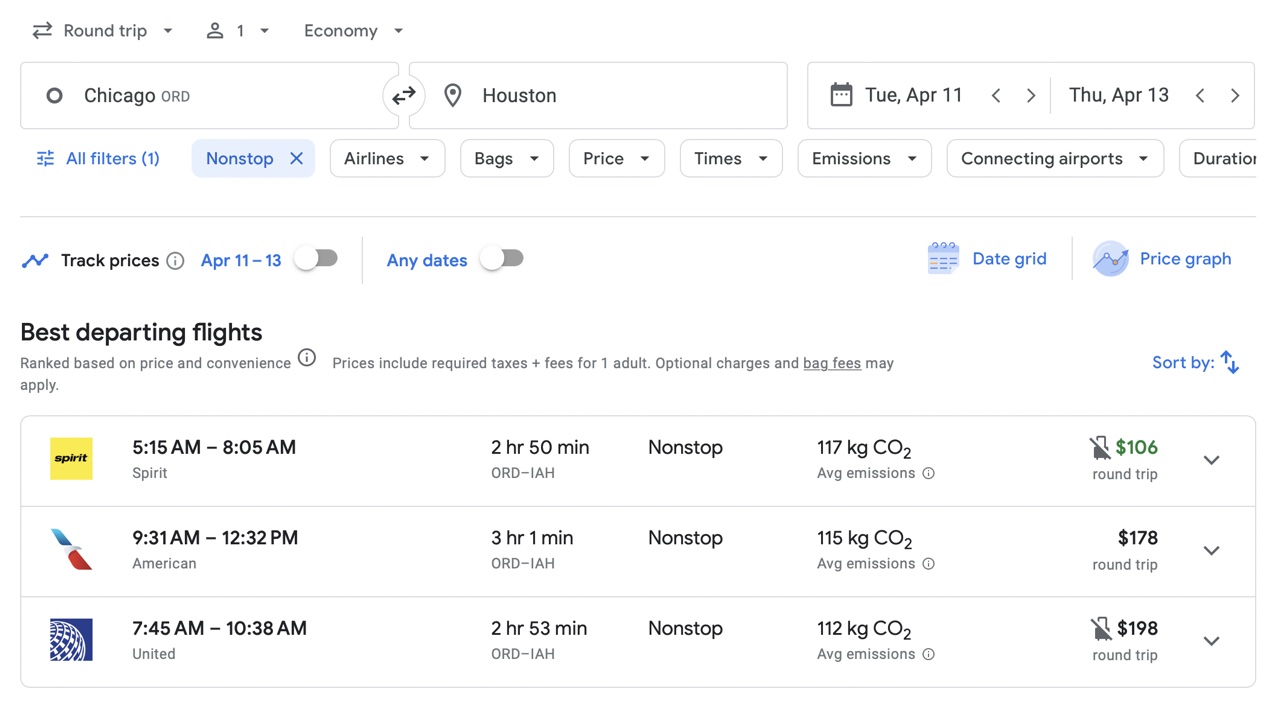
Switching to American’s hub, United is $20 cheaper but remains 268% more than the price of Spirit.
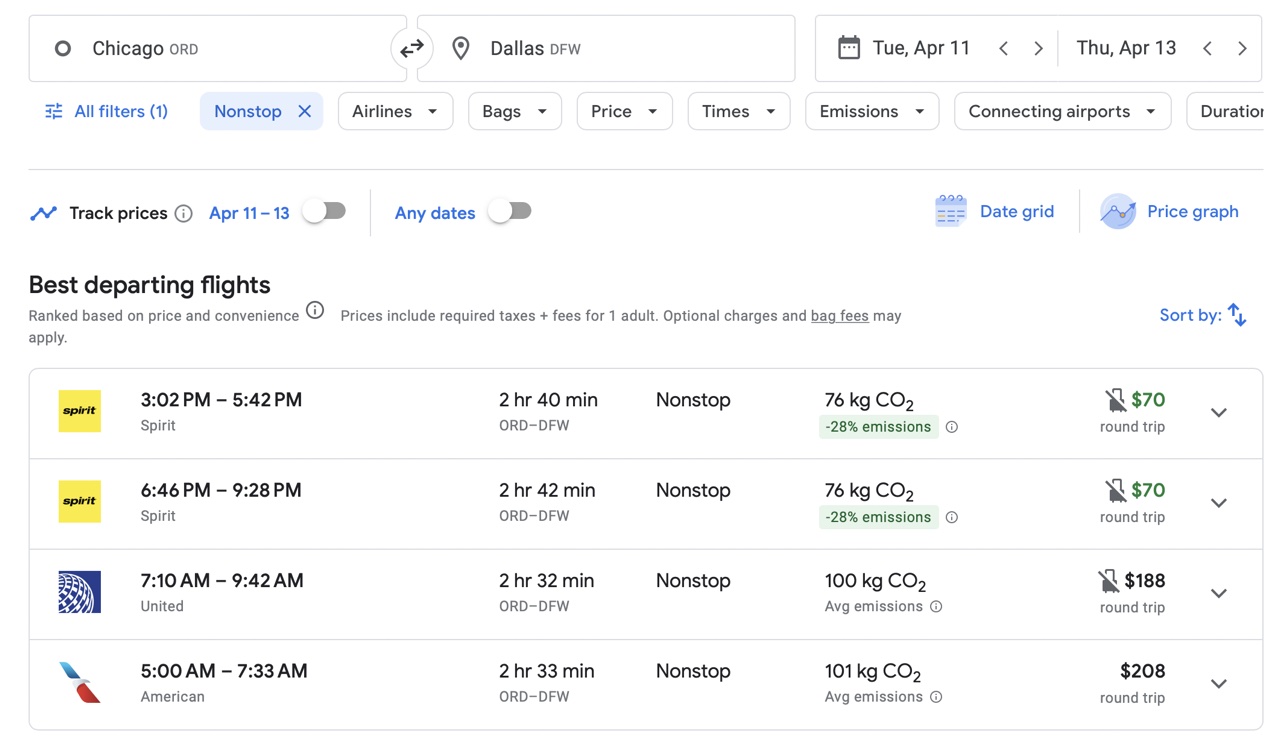
Houston to New Orleans is 300% more expensive on United than it is on Spirit.
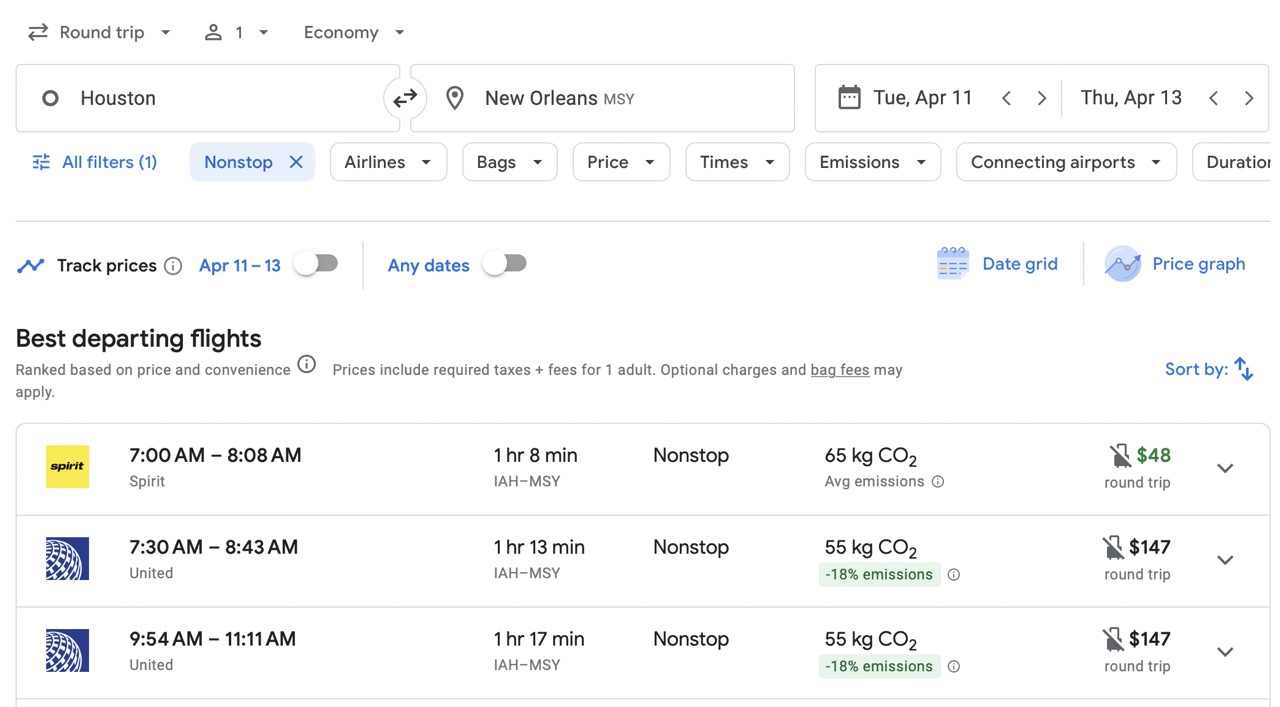
United and American are nearly four times as expensive as Spirit from Houston to Miami

Dallas to New Orleans is 400% more expensive on American than it is on Spirit. What are the chances this route sticks around if JetBlue takes over?
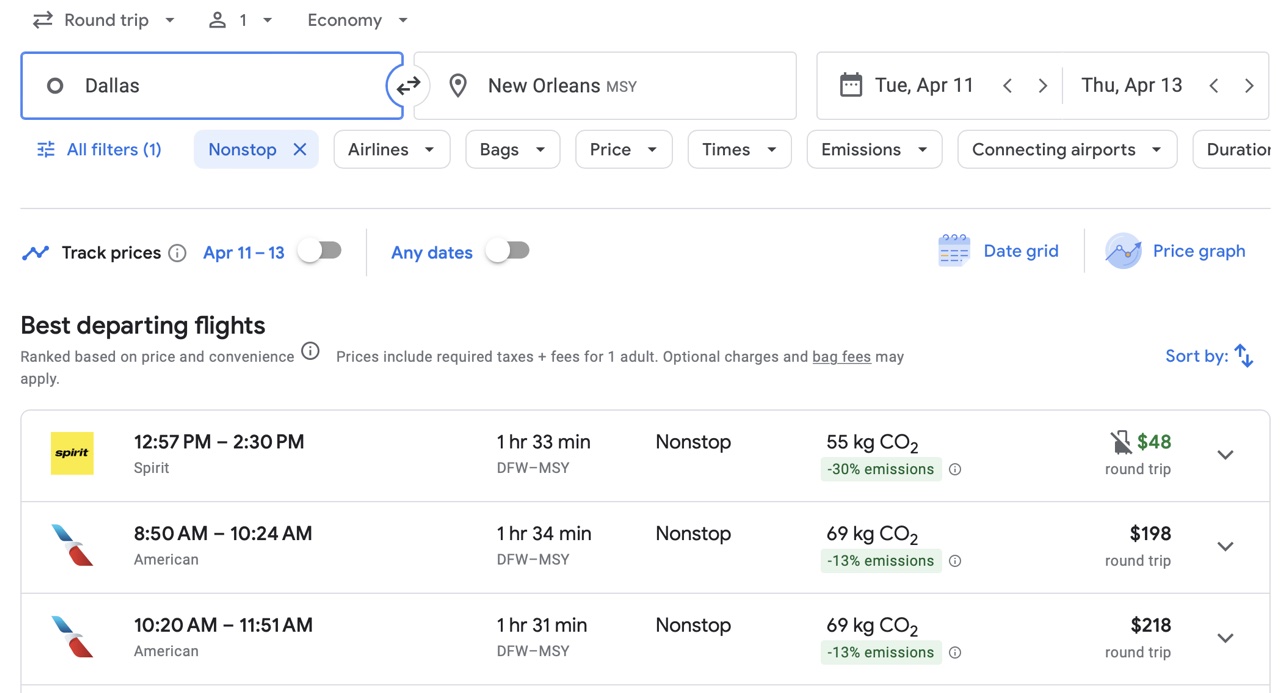
Dallas to New York LaGuardia is actually cheaper on American and Delta by $5 but take Spirit out of the market and I’m not confident they continue to kick each other’s shins in the same way and remain competitive.

Boston to Miami (not including Fort Lauderdale) is the one place where Frontier makes an appearance. Spirit and Frontier match each other for the low price and Frontier would likely stay affordable in this example. JetBlue will likely match its own price if it keeps the Spirit frequency, thus halving the number of cheap seats on the market.
Assuming both the Frontier and Spirit flights are going out more than half full, some of those consumers would have to flow to the higher fares or don’t fly at all.
Even if JetBlue continues to fly the frequency with Spirit aircraft, they have already been clear they will homogenize the fleet removing seats – if the DOJ does not block JetBlue Airways acquisition there’s a guarantee of fewer cheap seats on this route. In a joint statement, Spirit CEO Ted Christie and JetBlue CEO Robin Hayes stated that greater utilization of aircraft will allow the combined carrier to keep prices low.
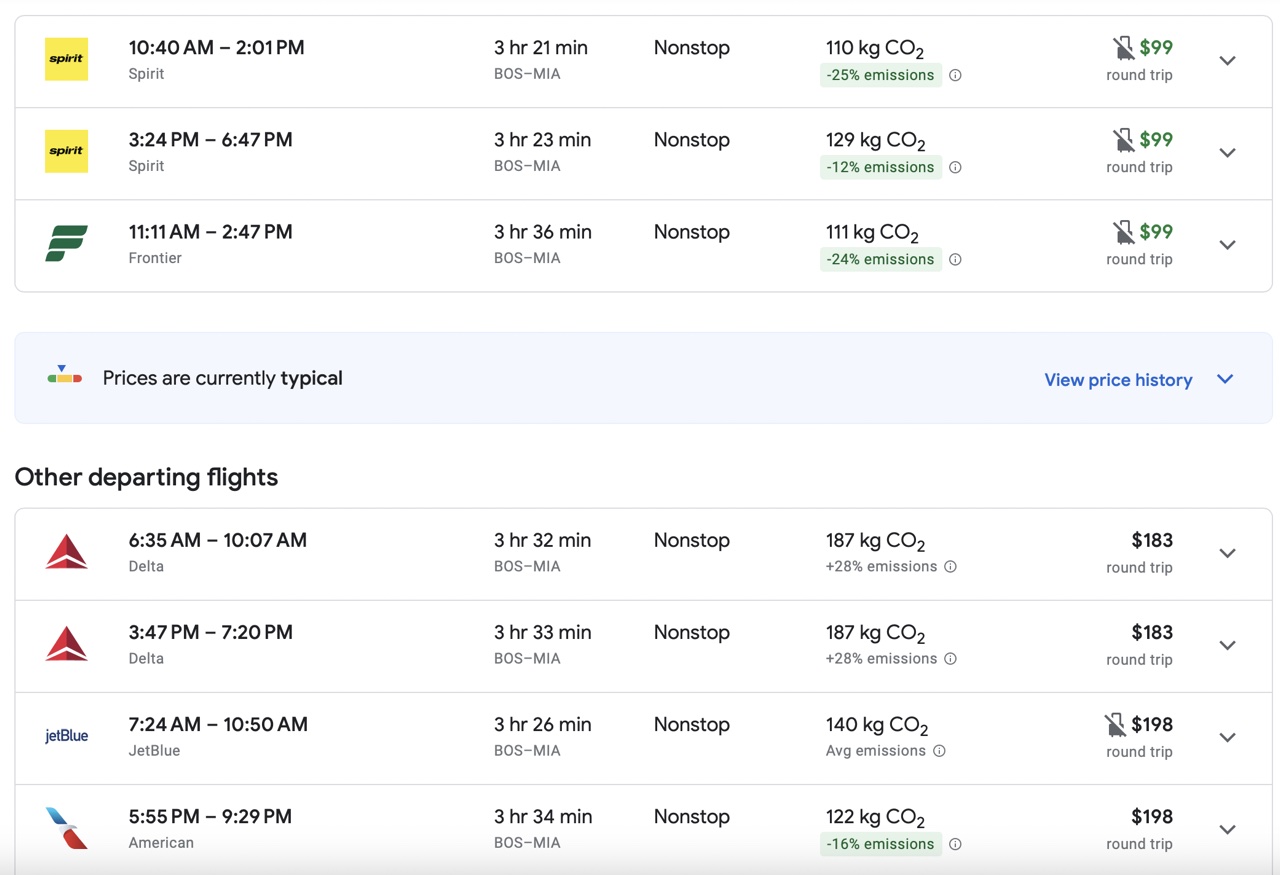
Looking at a leisure route, Detroit to Myrtle Beach is half as expensive on Spirit than the comparable flight on Delta. Delta includes more than Spirit, though after carry-on bags ($60 roundtrip), a snack and drink in each direction ($10 roundtrip), and wifi ($16 roundtrip), Delta is still 20% higher. However, if you don’t plan on using the wifi, if you bought a drink in the airport, if you don’t need a snack, and paid to check bags instead of carrying luggage onboard, Delta is clearly much more expensive.
The benefit of unbundling is that if these things don’t interest you, you don’t have to pay for them. Without Spirit in the market, you’re paying for them all whether you want to or not.
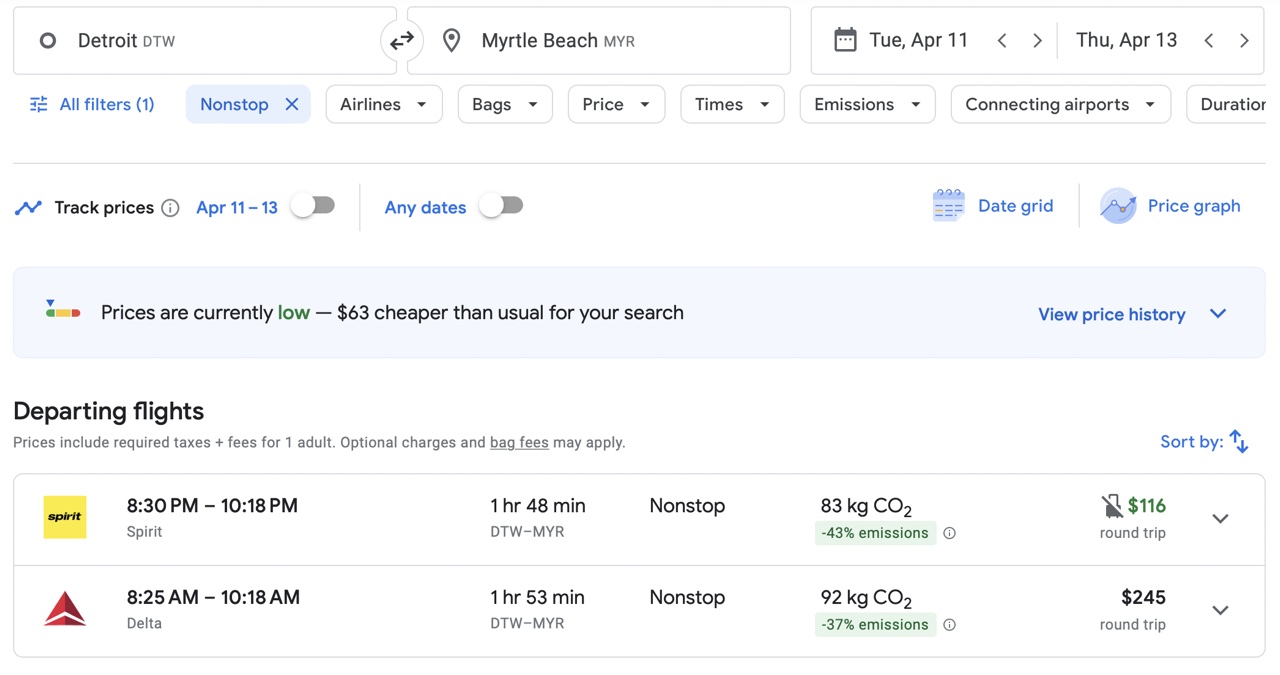
New York Laguardia to Detroit is another interesting situation. If there’s no Spirit it raises two prospects. The first is whether JetBlue will feel pressure to remain 40% cheaper than Delta. I posit that JetBlue would see this as an opportunity to raise fares rather than gain market share.
The second question is if the second aircraft remains on the schedule at all. If JetBlue decides to not operate the Spirit flight but keeps pricing the same, it still removes 150 affordable seats from the market, those travelers will have to spend more once the JetBlue flight is sold out (assuming it held) and then will be in for a big price jump with Delta. As those seats sell out, fares increase as well.

Even in cases where JetBlue is competitive with Spirit and represents savings against the Big Four airlines there’s no possible situation where it’s better for consumers. If JetBlue continues to fly the Spirit flight at Spirit rates but with its adjusted equipment, there will be fewer seats. If it removes seats from the route, travelers will pay more.
I spoke with several in the industry this week about how this merger benefits price-conscious consumers and not one of them could answer in the affirmative.
Take Spirit out of the equation in any of the examples above and demonstrate how price-conscious consumers hold the status quo or improve by a JetBlue-Spirit combination. It’s impossible
Before You Say Everything Is Extra On Spirit, It’s Extra On The Others Too
The fares compared here are for Spirit Airlines’ base product to American, United, and Delta’s basic economy. Delta and American Airlines do not charge for a carry-on bag though United and Spirit do.
For the rest:
- Seat assignments (with the exception of United for families as long as the adjacent seats are available together at booking)
- Upgrades
- Priority Boarding
- Checked luggage
- A meal or substantial snack
- Exit rows
- Wifi (with the exception of Delta)
- Ticketing over the phone
Spirit is cheaper even when adding in the extras. In the examples I used where prices ranged from 100-300% higher on competitors that include a carry-on, for example, the math would show that even after paying it, Spirit remains less expensive. For what it’s worth, Spirit’s wifi is also cheaper than every other carrier (other than Delta that includes it) and faster (with the exception of JetBlue.) Comparable snack boxes (in many markets, the exact same snack box) are less expensive on Spirit too.
The DOJ Has Confusing Messaging
Attorney General Merrick brought the lawsuit against JetBlue to block its attempt to create the fifth-largest carrier in the domestic airline industry. Messaging throughout the lawsuit and from the Biden Administration has been confusing as Cranky Flier points out,
“It’s these low fares under the ULCC model that make Spirit hugely important to the DOJ’s case that there will be harm. Let’s just forget that the feds have lambasted airlines for charging “hidden” fees (even though they aren’t hidden, but I digress). Now DOJ says it loves fees. “Spirit was among the first domestic airlines to unbundle these features and empower its cost-conscious travelers to prioritize the aspects of the flying experience they valued the most.” – Cranky Flier
The President made it clear he’s against hidden fees that add cost to travelers. I’d argue that resort fees are not optional so they should be included in the price while fees for seat assignments and a snack are optional therefore Spirit (and every other airline) is being transparent in its pricing. But to call Spirit an innovator for unbundling is clouding the situation.
Gary Leff enters a bunch of new elements into the issue, suggesting that the DOJ isn’t serious about keeping competition in place for air travel because it hasn’t: improved air traffic control technology, eliminated slot controls, or allowed foreign ownership of airlines. While those things would all improve the environment for tens of millions of travelers, that’s not really cogent to the DOJ case.
He points out that the DOJ also suggests that unbundling is good, but that doesn’t really make the case as to why the airlines can’t join and on that note, Leff has a point.
But all of this stuff distracts from the fundamental question of whether prices will increase not if JetBlue gets bigger, but if Spirit goes away remains the same.
Conclusion
The DOJ has finally filed a lawsuit to block the $3.8 billion Spirit acquisition by JetBlue. Its argument should be concise and clear. Rather than discuss anything else, JetBlue should have to demonstrate how it will keep prices low for consumers. I don’t think it can do that effectively.
What do you think? Is there any way travelers won’t see fewer seats and higher prices? Can the DOJ make this one case?


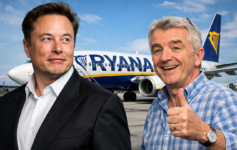

If the only metric is price, then yes, this hurts consumers. But what about consumers that want a good product? I would say spirit is partly responsible for the erosion of the quality of the product at the other airlines (basic economy for one). I was on a jet blue flight recently that had a nice big seat back screen, a nice little snack basket, and free wifi. In chicago there’s only about 2 B6 flights a day. I’d love for the merger to happen so jet blue can expand here
There is nothing preventing Avelo or Breeze or Frontier or Allegiant or a new startup from copying Spirit’s model of serving mainstream business routes at a low frequency with an ULCC pricing structure.
More credible competition for the Big4 is favorable for consumers and will impact far more consumers than does Spirit today. Your pricing comparisons are not relevant for many consumers. All it takes is to have any elite status or a credit card and then things like bags and seat assignments and ticketing fees quickly make the economic comparison look different.
Why do you think the Big4 airlines and employee unions are so opposed to the merger? Because they see more serious competition from it.
I say, let JetBlue bulk up to become a more serious competitor to the Big4, and make sure that gates and slots are available to ULCCs who want to grow. That’s what DOJ and DOT should focus on, not regulating business decisions.
The vast majority of arguments against airline mergers assume that the current competitive situation is set in stone. That’s simply not the case. The airline industry, while mature, is not stagnant. It’s dynamic. If fares go up on a particular route, it doesn’t take much for a competitor to come in and compete.
All this talk of the “Sky is Falling” is BS!!
Remember, the “Consolidated B6” will be #5 in the US. Also, most of its Focus Cities overlap with existing or neighboring airport hubs of the big four. THAT’S NOT AS MUCH LEVERAGE AS ONE MIGHT THINK CONSIDERING THE BIG FOUR CONTROL OVER 75% OF THE DOMESTIC MARKET AND ALMOST ALL OF THE FOREIGN MARKET.
As for the absorption of NK, I doubt most will miss it. One of its prime weaknesses was “one flight a day legs” in its network. When things went wrong, there was no plan B or afternoon flight to help make up for the log jam at Spirit. Should NK fade out of the picture, Allegiant, Breeze, Avelo, Frontier, & Sun Country will pick up any flights that fall thru the crack. These airlines smell blood in the air when it comes to supplemental airline charges.
Also, B6 has no regional partner (ie: Republic, Mesa, Skywest) nor airport lounges. That makes it harder to compete with UA, DL, & AA.
Biden needs to be more focus on the deficit, credit limit, and Social Security. His legacy will be that Nancy Pelosi ran the party, not him.
I’ll take a stab at refuting your proof. Examples of city pair fares is hardly proof of harm or damage. Had you provided some useful ‘ASM’ (available seat mile) metrics that demonstrate your point then perhaps your argument would be more convincing.
Sure, we know CASM, PRASM, TRASM (both SLA and not) are higher for the large carriers than for Spirit. Jet Blue resides somewhere in the middle. Who’s to say where those metrics go with a merger? We can guess, but the gap doesn’t prove anything. Even a lot of that gap could be normalized away if looking at average fares from all the little cities the majors serve that Spirit and Jet Blue ignore at this point. And those metrics are so skewed by ancillary fees that we would have a healthy debate that ended up tied.
I really don’t have much of an opinion one way or the other regarding the merger, but I did find your analysis rather dull.
The protection of the USA consumer arguments fall flat. What if subsequently either JetBlue or Spirit airlines fail. Where is the consumer protection then? I don’t fly Spirit nor the big three lately but I fly JetBlue. JetBlue needs to strengthen it’s company to compete against the other airlines that the government allowed to merge. Blue Basic (which I fly) is part way toward the Spirit model and there are other ultra low cost competitors to step in if JetBlue exits some markets due to the merger.
Wow… so many factual mistakes in this. Delta is the only one with free WiFi? Did you completely or “conveniently” miss that the only reason has free WiFi is because JetBlue did it years ago before anyone else? Did you also miss that JetBlue offers included (free) unlimited snacks, including even a pick what you want Pantry that no one else has? This article is so incredibly biased against JetBlue. More worthless rubbish from people who didn’t get real degrees in college.
It is a bad deal and I admit where I live it would almost be like bringing a demolition ball into the FLL airport with Spirit providing a far better route network and product out of FLL than JetBlue even does. And they add a lot of pressure onto everyone. Not even counting the HQs in Miramar and Dania Pointe (which is still working towards completion this year). Just to Broward county alone it would be a massive hit since JetBlue would probably eliminate a lot of roles and certainly with redundant positions.
The irrational entitlement shown by your absurd argument claiming what the one standard should be in allowing this merger is something society is riddled with but we certainly don’t want a travel blog encouraging much less expanding this view. This standard is not the purpose of a business and articles like this cause those who understand what that actually is to not want to read the site anymore.
@JW Wintersteen – Thank you for reading and welcome as your first comment. Can you please expand on this, “The irrational entitlement shown by your absurd argument claiming what the one standard should be in allowing this merger is something society is riddled with but we certainly don’t want a travel blog encouraging much less expanding this view.”
Considering the lack of consistent profitability by airlines, it seems that leaving smaller carriers vulnerable to failure is the least effective route to competition. The market is wiser than centralized authority.